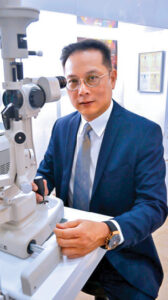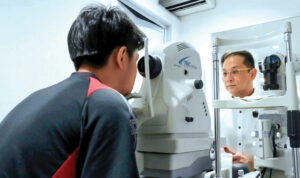Transforming and bringing together the optometry industry under a single ecosystem for better eye healthcare service deliverance
The importance of eye healthcare services and specialists is fundamental and essential for patients needing eye care. The role of eye care specialists is ever evolving and expanding to cater to the rapid rise of vision impairments and diseases.
Initially, optometrists concentrated on prescribing the proper spectacles customised for each patient. They later learned to evaluate and diagnose most, if not all, types of eye diseases. Thus, optometrists became primary eye care practitioners.

Murphy Chan
“The retail optical shop’s service was solely about selling spectacles and contact lenses and doesn’t emphasise eye care examination. However, their personalised customer service is excellent,” said optometrist Datuk Murphy Chan, the CEO and founder of Eyecon Optometry.
Upon graduation, Chan began his optometric journey at a retail optical shop and later in the corporate sector. “I learnt structure, scalability and protocols, which is an instrumental system for growth. However, it lacks personalised interaction with customers.
Combining the strengths of both experiences, he opened Eyecon Optometry, an optometry centre with personalised service and a systematic system to continue developing and improving the optometric role and service. He now runs a chain of optometry practices in Malaysia.
Chan is confident that many like-minded practitioners are strongly interested in further developing the optometric profession and expanding the traditional role and boundaries of optometrists.
Transforming the optometry industry
The optometry industry needs a supportive and conducive environment to continue its development and expansion.
“We need the environment to support the growth of qualified professionals who constantly update their skills and upgrade instrumentations and equipment in their practice.

He believes that building a new generation of entrepreneurial optometrists to lead the new standards is key to transforming the optical industry.
“We need to transform the whole ecosystem of the optometry industry.
“So, we are investing in the new generation of entrepreneurial optometrists, who are not just optometrists in the clinical and academic sense but also have entrepreneurial skills. They will no longer follow the world standards, but instead pioneer and lead the world standards.”
Optometry industry under an ecosystem
As for the overall eye healthcare system, Chan said that bridging together public and private entities in the eye care industry under an ecosystem would be beneficial to public eye healthcare.
“Our approach must be collaborative. For example, we can create eye health awareness and market vision solutions with the ACUVUE partnership,” he said when asked how the partnership has helped Eyecon in the new normal of doing business.

“Another potential and beneficial collaboration are with the general practitioners. First and foremost, we can serve the public efficiently.
“We are clear with our role as the primary eye care provider, covering more than 80 per cent of primary eye care for patients outside the general hospitals and practitioners.
“This results in easing the congestion and hospitals able to prioritise secondary and tertiary examinations and treatment.
“The other is that we will be able to share this data pool for the betterment of the nation’s whole public eye healthcare system.”
Optometry in Malaysia
Optometry in Malaysia is one of the best in the Southeast Asia region, said Chan.
“We can observe this within the three components: academic, legislative, and standard of practice.
“Regarding academics, we have about six optometry universities or schools in Malaysia, ranked second behind the Philippines.
“In terms of legislation, we are top because we have had a proper Optical Act since 1990,” he said.
“Meanwhile, regarding the standards of practices, we have a structured system and role, as we have opticians and optometrists.
“The issue is that some unlicensed practices claim themselves as registered professional opticians or optometrists, but they are not.” – The Health







